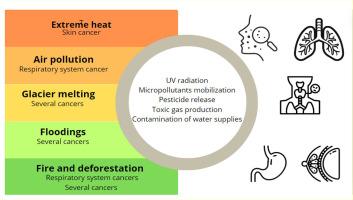气候变化和癌症风险:关键因素和新出现的健康威胁
IF 2.7
引用次数: 0
摘要
由全球变暖和环境退化驱动的气候变化对人类健康具有深远影响,包括它在癌症发病率方面的潜在作用。气温上升、紫外线辐射增加以及空气质量的变化都与各种癌症风险有关。农业实践和粮食安全的中断可以通过改变饮食和接触农药等致癌化合物来影响癌症风险。由洪水和化学品径流引起的水污染也可能增加致癌物质的暴露。弱势群体,特别是低收入地区的弱势群体,面临更大的风险,因为他们往往无法获得医疗保健和预防措施。在此背景下,本综述探讨了气候变化影响与癌症风险之间的关系,讨论了这些事件如何增加癌症的发展。本文章由计算机程序翻译,如有差异,请以英文原文为准。

Climate changes and cancer risk: Key factors and emerging health threats
Climate change, driven by global warming and environmental degradation, has far-reaching implications for human health, including its potential role in cancer incidence. Rising temperatures, increased ultraviolet (UV) radiation, and changes in air quality are linked to various cancer risks. disruptions in agricultural practices and food security can influence cancer risk through changes in diet and exposure to carcinogenic compounds such as pesticides. Water contamination due to flooding and chemical runoffs may also increase exposure to carcinogens. Vulnerable populations, particularly those in lower-income regions, are at heightened risk, as they often lack access to healthcare and preventive measures. In this context, this review addresses the relationship between climate changes impact and cancer risk, discussing how these events can increase cancer development.
求助全文
通过发布文献求助,成功后即可免费获取论文全文。
去求助
来源期刊

Hygiene and environmental health advances
Environmental Science (General)
CiteScore
1.10
自引率
0.00%
发文量
0
审稿时长
38 days
 求助内容:
求助内容: 应助结果提醒方式:
应助结果提醒方式:


